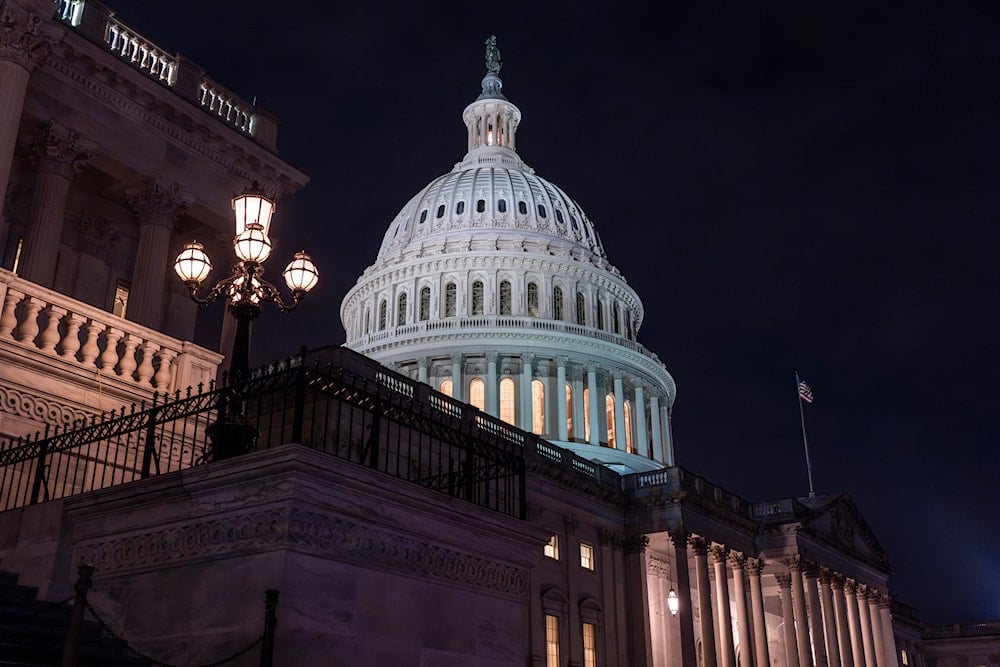Biden set to sign government funding bill, averting shutdown
The Democratic-controlled US Senate passes a bipartisan plan to prevent the first federal government shutdown since 2019.
-

The Capitol is pictured in Washington, on December 20, 2024. (AP)
A report by the Associated Press (AP) on Saturday reports that as the government shutdown deadline approached, the Senate swiftly approved a bipartisan plan early Saturday to temporarily fund federal operations and disaster relief, postponing President-elect Donald Trump’s request for a debt limit increase until the new year.
House Speaker Mike Johnson emphasized that Congress would "meet our obligations" and ensure federal operations continued without disruption during the Christmas holiday season. However, the day’s resolution remained unclear after Trump demanded that any agreement include a debt ceiling increase. In an early morning post, he threatened that if his demand wasn’t met, the closures should "start now."
The House passed Johnson's new bill with an overwhelming vote of 366-34. The Senate worked late into the night to approve it by 85-11, just after the deadline, according to AP. At midnight, the White House announced that it had halted shutdown preparations.
“This is a good outcome for the country, ” Johnson said after the House vote, adding he spoke with Trump and the president-elect “was certainly happy about this outcome, as well.”
Read next: Money that pays off: Major donors assume key positions in Trump admin.
President Joe Biden, who had taken a more low-key role during the turbulent week, was expected to sign the measure into law on Saturday, AP reported.
“There will be no government shutdown,” Senate Majority Leader Chuck Schumer said.
The final measure was Johnson's third attempt to keep the government open, raising doubts about his future as House speaker amid criticism from GOP colleagues and pressure from Trump and Elon Musk, who influenced the process from afar.
Without Republican support, the speaker knew there wouldn't be enough GOP votes to pass any funding package, as many deficit hawks in the party favored cutting government spending and opposed increasing the debt.
Instead, with full control of the White House, House, and Senate next year and ambitious plans for tax cuts and other priorities, Republicans are showing they will often need to rely on Democrats for the votes necessary to maintain routine government operations.
The 118-page package
The pared-down 118-page package would fund the government at current levels until March 14, while providing $100 billion in disaster aid and $10 billion in agricultural assistance for farmers, according to AP.
Trump’s demand to lift the debt ceiling was removed, with GOP leaders telling lawmakers it would be addressed in the new year alongside tax and border proposals. Republicans made a "handshake agreement" to raise the debt limit and cut $2.5 trillion in spending over the next decade.
The AP suggested it's essentially the same deal that failed the night before in a major setback, opposed by most Democrats and some conservative Republicans, but without Trump’s debt ceiling demand.
However, it’s much smaller than the original bipartisan deal Johnson negotiated with Democratic and Republican leaders — a 1,500-page bill that Trump and Musk rejected, forcing him to restart. The original bill included a range of provisions, such as controversial pay raises for lawmakers, as well as widely supported measures that now face a harder path to becoming law.
The power duo, 'ridiculous debt ceiling'
Trump, still unsworn into office, is demonstrating both the influence and limits of his power over Congress as he intervenes from Mar-a-Lago, alongside Musk, who is leading the new Department of Government Efficiency, as reported by AP.
The report adds that the incoming Trump administration promises to cut the federal budget, lay off thousands of employees, and relies on Republicans for a major tax package. Unlike lawmakers, Trump isn't concerned about shutdowns, having initiated the longest government shutdown in history during his first term.
“If there is going to be a shutdown of government, let it begin now,” Trump posted early in the morning on social media.
Read next: Under Biden, US budget deficit hits historic high of $6.6 trillion
More important to the president-elect was his demand to push the contentious debt ceiling debate off the table before returning to the White House. With the federal debt limit set to expire on January 1, Trump wants to avoid having the first months of his new administration consumed by difficult negotiations in Congress over raising the nation’s borrowing capacity, according to AP. Now, Johnson will be responsible for delivering on this.
“Congress must get rid of, or extend out to, perhaps, 2029, the ridiculous Debt Ceiling,” Trump posted — increasing his demand for a new five-year debt limit increase. “Without this, we should never make a deal.”
Government workers had already been instructed to prepare for a federal shutdown, which would keep millions of employees, including military personnel, without paychecks during the holiday season.

 5 Min Read
5 Min Read








